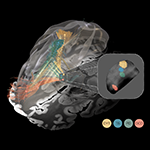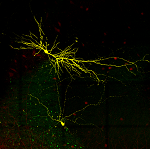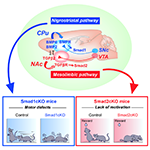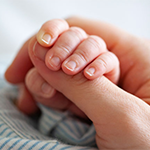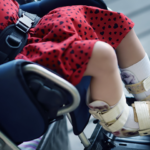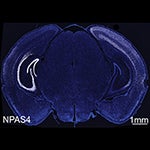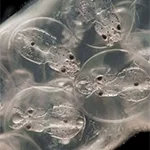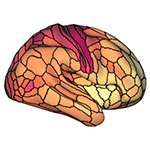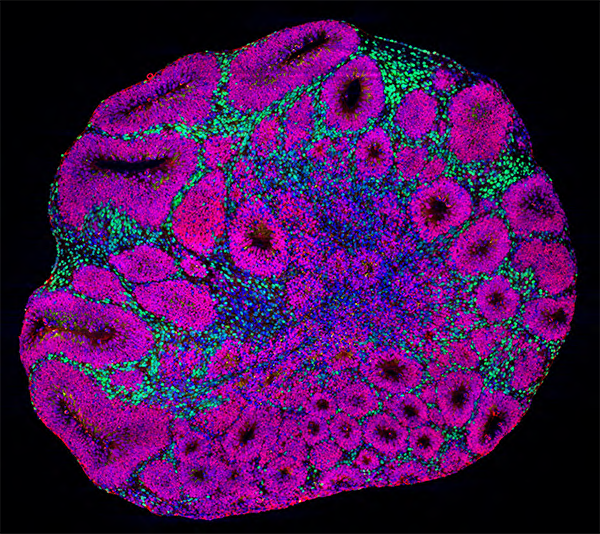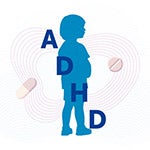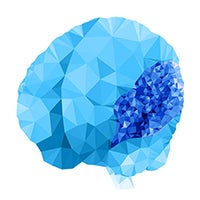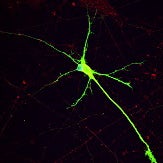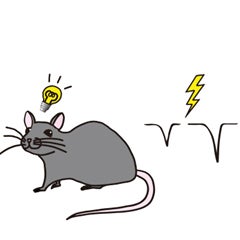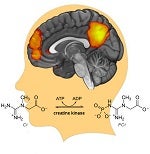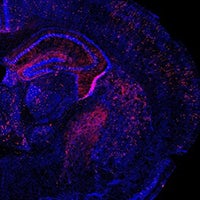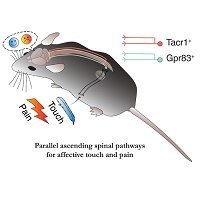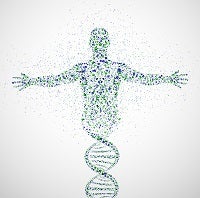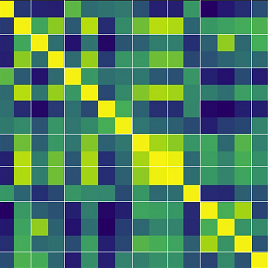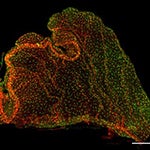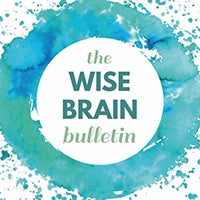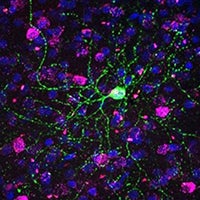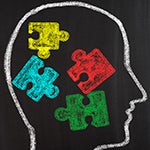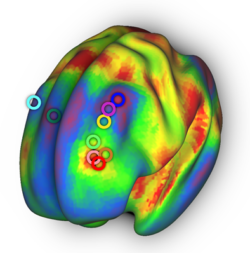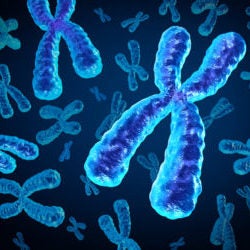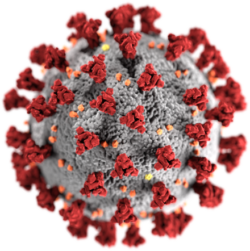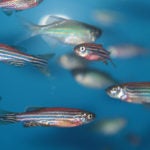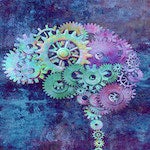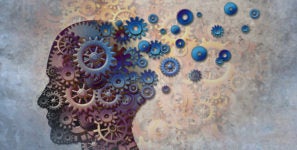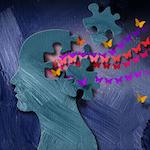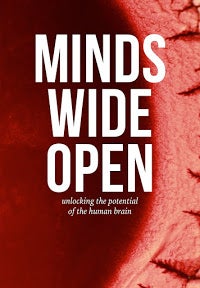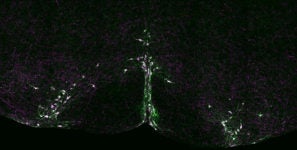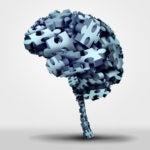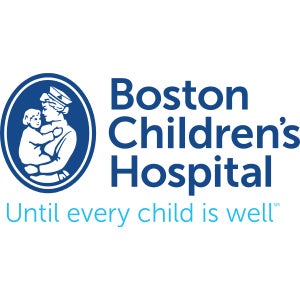Neuro Topics - Neurodevelopmental Disorders
SEARCH OTHER RESEARCH AREAS
April 15, 2024
Deep brain stimulation is a powerful therapeutic approach for severe brain circuit dysfunctions that can effectively alleviate the heterogeneous symptoms characteristic of Parkinson’s disease, dystonia, Tourette’s syndrome, and obsessive-compulsive disorder. Barbara Hollunder (Lab of Andreas Horn) explains what invasive brain stimulation can teach us about the circuit architecture of the brain’s dysfunction — and which commonalities it shares with a prism.
Original article in: Nature Neuroscience >
March 27, 2024
Topiramate — an antiseizure medication prescribed to treat epilepsy as well as migraines and bipolar disorder — does not appear to increase the risk of autism spectrum disorder (ASD) among children exposed to it prenatally, according to a new study led by Harvard T.H. Chan School of Public Health.
Original article in: New England Journal of Medicine >
February 6, 2024
Yu-Tzu Shih, Jason Alipio, and Amar Sahay share new research on the autism linked gene Dyrk1a. They find that developmental differences in neural circuitry and social cognition observed in mutant mice with only one copy of the Dyrk1a gene can be rescued by targeting inhibitory neuron plasticity in adulthood.
Original article in: Neuron >
October 6, 2023
Akiko Terauchi and Hisashi Umemori share new research that identified the pathway-specific signals that establish functionally segregated dopaminergic synaptic connections in the mammalian brain. The findings may provide strategies to treat pathway-specific disease symptoms in diseases like Parkinson's disease, schizophrenia, and depression, by targeting the pathway-specific molecular signals.
Original article in: Cell >
March 31, 2023
HMS News article on new research from Roy H. Perlis and colleagues, first author Andrea G. Edlow, finding that male but not female babies born to women who tested positive for SARS‐CoV‐2 during pregnancy were more likely to be diagnosed with a neurodevelopmental disorder in their first 12 months.
Original article in: JAMA Network Open >
March 9, 2023
Boston Children's Hospital Answers article on new research from Siddharth Srivastava, Annapurna Poduri, and colleagues confirming a previous study finding that about 1 in 4 children with cerebral palsy (CP) who had DNA testing had genetic variants likely to have caused or contributed to their condition.
Original article in: JAMA Neurology >
February 23, 2023
In order for neurons to be ‘plastic’ and adapt in response to environmental stimuli, they must undergo rapid changes in gene expression. Sometimes these rapid changes can lead to DNA damage. Daniel Gilliam and Elizabeth Pollina of the Greenberg lab describe their discovery of a DNA repair pathway that neurons use to address this challenge.
Original article in: Nature >
December 8, 2022
Harvard Gazette article on new research from Kristen Koenig and colleagues, co-first authors Francesa R. Napoli and Christina M. Daily, applying a new live-imaging technique to watch the creation of neurons in squid embryos in almost real-time. Tracking these cells through the development of the nervous system in the retina they discovered that these neural stem cells behaved very much like those in vertebrates during nervous-system development.
Original article in: Current Biology >
September 29, 2022
Boston Children's Hospital Answers article on new research from Joseph Gonzalez-Heydrich, David Glahn, and colleagues, co-first authors Catherine Brownstein and Elise Douard (Université de Montréal) finding that children with early-onset psychosis have similar rates of deleterious copy number variants (CNVs) as children diagnosed with autism spectrum disorder. The new study suggests that all children and adolescents with a psychotic diagnosis might benefit from undergoing genetic screening.
Original article in: American Journal of Psychiatry >
September 9, 2022
Graham Baum and colleagues from the lab of Leah Somerville report on new MRI data analyses investigating the timeline and topography of myelin development in the brain from childhood to early adulthood, using data from the Human Connectome Project in Development. This work is part of a project supported by the HBI Bipolar Disorder Seed Grant program.
Original article in: Journal of Neuroscience >
May 24, 2022
HMS News article on new research from Christopher J. Hartnick and colleagues, first author Phoebe K. Yu, demonstrating that a surgically implanted device that moves the tongue forward during sleep can safely and effectively reduce sleep apnea in adolescents with Down syndrome.
Original article in: JAMA Otolaryngology–Head & Neck Surgery >
May 4, 2022
HMS News article on new research from Benjamin Neale and colleagues at the Broad Institute, first author Duncan Palmer, revealing new insight into the condition’s molecular underpinnings.
Original article in: Nature Genetics >
March 8, 2022
HMS News article on a new report on depression commissioned by the Lancet and World Psychiatric Association. The report included recommendations for how health care practitioners, policymakers, community members, and people with depression can work together to build sustainable solutions in response to the ongoing mental health crises caused by the COVID-19 pandemic.
Original article in: Nature Genetics >
March 8, 2022
Erin Hecht answers this question as part of Harvard Gazette's Wondering, a new series of random questions answered by Harvard experts.
Original article in: Nature Genetics >
March 8, 2022
Bruna Paulsen shares new research from the labs of Paola Arlotta and colleagues, using organoid models of the human cerebral cortex to uncover cell-type-specific neurodevelopmental abnormalities that are shared across three different ASD risk genes.
Original article in: Nature Genetics >
February 7, 2022
HMS News article on new research from Siddharth Srivastava, Annapurna Poduri, Mustafa Sahin, and colleagues, first author Maya Chopra, finding that up to 1 in 4 patients with CP have an underlying genetic condition.
Original article in: Annals of Clinical and Translational Neurology >
September 1, 2021
Boston Children's Hospital Answers article on new research from the Developmental Behavioral Pediatrics Research Network (DBPNet), first author Elizabeth Harstad, comparing two types of ADHD medications in preschool-age children. They found that alpha-2-adrenergic agonists like guanfacine and clonidine are effective in reducing ADHD symptoms but with a lower rate of side effects than stimulants.
Original article in: JAMA >
August 11, 2021
Boston Children's Hospital Answers article on new research from Christopher A. Walsh and colleagues, first author Richard Smith, linking mutations in the gene ATP1A3 to polymicrogyria, a disease causing irregular folds and disorganized layering in the cortex, often resulting in severe developmental and intellectual disabilities.
Original article in: PNAS >
Disease Characteristics of Dopaminergic Neurons in Neurodevelopmental and Neuropsychiatric Disorders
July 20, 2021
Maria Sundberg shares new research from the lab of Mustafa Sahin on the role of a small piece of chromosome 16, called the 16p11.2 locus, in disease phenotypes of dopaminergic neurons. The team identified that RhoA pathway activation led to network dysfunction in 16p11.2 deletion neurons. Its inhibitor, Rhosin, rescued the hyperactivity of these neuronal networks. In the future, the RhoA pathway and its inhibitors may serve as potential therapeutic targets.
Original article in: Nature Communications >
May 6, 2021
Erin Johnson-Venkatesh and Hisashi Umemori share their work trying to understand why X-linked PCDH19-related disorder occurs only in females, and not males – when the opposite is typical for most disorders emanating from mutations on the X-chromosome. They find that inactivation of one copy of Pcdh19 results in a molecular mismatch at hippocampal synapses, leading to functional impairments in female, but not male mice.
Original article in: Science >
April 23, 2021
Harvard Gazette article on new research from Katie A. McLaughlin and colleagues, first author Jorge Cuartas, suggesting that spanking may affect a child’s brain development in ways similar to more severe forms of violence.
Original article in: Child Development >
March 10, 2021
Xiaopeng Song from the lab of Fei Du at McLean Hospital shares new human brain imaging work revealing that an impairment in energy production may underlie the problems in functional neural connectivity observed in schizophrenia and bipolar disorder.
Original article in: Molecular Psychiatry >
March 9, 2021
Harvard Gazette article on a recent Facebook Live event "The Coronavirus Pandemic: Grieving and Mental Health". This article highlights the work of Christy Denckla, a postdoc at the Broad Institute and Harvard T.H. Chan School, whose research focuses on resilience following exposure to trauma.
Original article in: Molecular Psychiatry >
March 9, 2021
Round up of awards and honors earned by the HBI community.
Original article in: Molecular Psychiatry >
December 10, 2020
Xin Jin, working with the teams of Paola Arlotta, Feng Zhang, Aviv Regev and Joshua Levin, shares the development of in vivo Perturb-Seq, a high-content and scalable method to study cohorts of risk genes implicated in brain disorders.
Original article in: Science >
November 30, 2020
Round up of awards and honors earned by the HBI community.
Original article in: Science >
November 13, 2020
Seungwon (Sebastian) Choi shares new research from the labs of David Ginty and colleagues at the University of Pittsburgh. They applied new mouse genetic tools in conjunction with anatomical, physiological and behavioral approaches to better understand the functional organization of ascending touch, thermal and pain pathways.
Original article in: Nature >
November 13, 2020
Klaus Schmitz and Kyriacos Markianos share a powerful method for identifying important noncoding regions in the human genome—revealing the potential significance of gene regulation in cognitive and social function.
Original article in: Scientific Reports >
November 13, 2020
Tatsuya Tsukahara shares new research from the lab of Sandeep Robert Datta, on the use of their Motion Sequencing (MoSeq) behavioral analysis technique, built on 3D animal postures and unsupervised machine learning, to organize large and complex behavioral datasets from mice treated with neuroactive and psychoactive drugs.
Original article in: Nature Neuroscience >
November 12, 2020
Jin Cui, Frederick Shipley, Neil Dani, Mark Andermann, and Maria Lehtinen share new research from the Andermann and Lehtinen labs revealing the secretory and calcium dynamics of ChP epithelial cells, which are responsible for secreting CSF and its principal components, as well as movements and functions of macrophages, which represent the largest class of immune cells residing in the ChP.
Original article in: Nature Neuroscience >
November 3, 2020
Sarah Roehrich, a speech-language pathologist who works in Lowell, MA, shares an article she’s written for the Wise Brain Bulletin. Spanning basic science, education and clinical research, Roehrich’s article describes how experiences influence brain development from infancy through early childhood. Her piece highlights the plasticity research of Takao Hensch and others, and discusses outreach activities led by Hensch’s NIMH Silvio Conte Center for Mental Health.
Original article in: Nature Neuroscience >
November 2, 2020
Harvard Health Publishing article discussing recent findings by the AARP on the impact of music on cognitive and emotional well-being.
Original article in: Nature Neuroscience >
October 21, 2020
HMS News article on how new research into a newly discovered primate brain cell type could improve studies on neuropsychiatric disease. From the labs of Stephen McCarroll, Guoping Feng, Gordon Fishell, Sabina Berretta, Leslie Kean, Chris Walsh and several others, first author Fenna Krienen.
Original article in: Nature >
August 24, 2020
Harvard Gazette article recapping a recent Zoom seminar with author and Lewis K. Chan Arts Lecturer and Professor of the Practice of Non-Fiction, Michael Pollan discusses his latest work on the world’s most-used psychoactive substance.
Original article in: Nature >
August 24, 2020
HMS News article on new research from the labs of Isaac Kohane and colleagues, co-first authors Yuan Luo and Alal Eran, revealing a subtype of autism associated with lipid abnormalities.
Original article in: Nature Medicine >
May 15, 2020
By Shan H. Siddiqi, MD:
We’ve known for over a century that different brain regions have different functions. Now we can finally translate this into symptom-specific treatment targets.
Original article in: American Journal of Psychiatry >
May 13, 2020
The Longwood Chorus has recently released a music video featuring a virtual performance of “Bridge Over Troubled Water”, highlighting members' contributions to fighting COVID-19.
Original article in: American Journal of Psychiatry >
May 11, 2020
HMS News article on new research from the labs of Steven McCarroll and colleagues, first author Nolan Kamitaki, pinpointing genes underlying sex biases in autoimmune disorders and schizophrenia.
Original article in: Nature >
April 8, 2020
Preliminary research from the lab of Bob Datta, joint first authors David Brann, Tatsuya Tsukahara, and Caleb Weinreb, examines cell types in the olfactory epithelium that might mediate infection by SARS- CoV-2, the causal agent in COVID-19.
Original article in: Nature >
April 8, 2020
HMS News article highlighting how Longwood Chorus members create community through song, with quotes from Christopher Chen, postdoctoral fellow in the lab of Wade Regehr, David Mazumder, graduate student in the lab of Gabriel Kreiman and several othe
Original article in: Nature >
April 8, 2020
Harvard Gazette article on new research from the labs of Mark Fishman and colleagues, exploring how genes related to psychiatric conditions can influence group behavior in zebrafish.
Original article in: iScience >
March 10, 2020
A monthly round-up of awards and honors earned by Harvard-affiliated faculty, students, and staff.
Original article in: iScience >
March 4, 2020
HMS News article on new research from the lab of Jacob Hooker, first author Nicole Zürcher, showing abnormally low levels of a key protein observed in brains of young men with autism spectrum disorder.
Original article in: Molecular Psychiatry >
February 3, 2020
Harvard Gazette Q+A with David Ginty and Lauren Orefice on a novel approach to treating tactile hypersensitivity in patients with autism-spectrum disorders.
Original article in: Molecular Psychiatry >
October 23, 2019
HMS News article on the first evidence of immune response targeting specialized brain cells in autism. From a postmortem study of human brains, from the lab of Matthew Anderson, first author Marcello DiStasio.
Original article in: Annals of Neurology >
October 16, 2019
New research from the labs of Bruce Yanker and colleagues, co-first authors Joseph Zullo and Derek Drake, shows that neural activity emerges as a factor in longevity.
Original article in: Nature >
October 11, 2019
Harvard University has received a $20 million gift from philanthropists Lisa Yang and Hock Tan, an alumnus of Harvard Business School, to establish The Hock E. Tan and K. Lisa Yang Center for Autism Research at Harvard Medical School.
Original article in: Nature >
August 8, 2019
New research points to potential therapy for abnormal touch sensitivity in autism spectrum disorders.
Original article in: Nature >
July 22, 2019
New research suggests that two simple, quantifiable measures — spontaneous fluctuations in pupil dilation or heart rate — could enable much earlier diagnosis of Rett syndrome and possibly other disorders with autism-like features.
Original article in: PNAS >
July 8, 2019
Harvard Gazette article on new research from Radcliffe Fellow Ani Patel suggesting that humans are not the only species who can dance to a beat.
Original article in: PNAS >
July 3, 2019
McLean's Deborah Levy and colleagues provide a proof-of-principle demonstration of symptom relief by targeting a specific genotype and links an individual structural mutation to the pathophysiology of psychosis and treatment response.
Original article in: Biological Psychiatry >
June 28, 2019
HMS News interview with Pascal Kaeser on the debut of a Wiki-like knowledge base for more than 1,000 synaptic genes.
Original article in: Biological Psychiatry >
October 31, 2018
A documentary film from the Tianqiao & Chrissy Chen Institute featuring interview with HBI co-director Mike Greenberg, has won three Cannes Corporate Media and TV Awards
Original article in: Biological Psychiatry >
October 23, 2018
HMS News article on new research from the lab of Susan Dymecki and colleagues, suggesting that certain serotonin neurons contribute to a fail-safe necessary for recovery from interrupted breathing in newborn mice
Original article in: eLife >
October 18, 2018
Xiaowei Zhuang was awarded this prize “for discovering hidden structures in cells by developing super-resolution imaging – a method that transcends the fundamental spatial resolution limit of light microscopy.”
Original article in: eLife >
October 16, 2018
Considered one of the highest honors in the fields of health and medicine.
Original article in: eLife >
October 9, 2018
BCH Vector Blog post on new work from the labs of Mustafa Sahin, Wade Regehr and colleagues, delineating sensitive periods for the treatment of cerebellum-mediated autistic-like behaviors in mice
Original article in: Cell Reports >
October 3, 2018
The Intellectual and Developmental Disabilities Research Center at Boston Children’s Hospital celebrated its fiftieth anniversary on October 30th.
Original article in: Cell Reports >
September 27, 2018
Congratulations to Paola Arlotta who was named chair of Harvard Department of Stem Cell and Regenerative Biology.
Original article in: Cell Reports >
August 29, 2018
Boston Children's Hospital Vector blog post about a recent paper from the labs of Christopher A. Walsh and colleagues, unveiling the role of extracellular vesicles in mammalian brain development.
Original article in: Cell Reports >
August 28, 2018
These grants help researchers launch careers in neuroscience and psychiatry and gather pilot data to apply for larger federal and university grants.
Original article in: Cell Reports >


